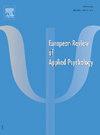Mental health and COVID-19: The moderating role of neuroticism and conscientiousness
IF 1.4
4区 心理学
Q3 PSYCHOLOGY, APPLIED
European Review of Applied Psychology-Revue Europeenne De Psychologie Appliquee
Pub Date : 2025-04-01
DOI:10.1016/j.erap.2024.101050
引用次数: 0
Abstract
Introduction
Empirical research has established that fear and perceived threat of COVID-19 are associated with anxiety and depression in the general population. Is unclear how personality traits may act as moderators, thus the present study explored these relationships.
Objectives
This study aimed to investigate the moderating role of neuroticism and conscientiousness on the relationship between (1) the perceived threat of COVID-19 and anxiety and depression separately and (2) the fear of COVID-19 and anxiety and depression separately.
Method
This cross-sectional study was based on a community sample of 295 adults (Mage = 37.2, SDage = 11.9) from Romania who participated online.
Results
Neuroticism and conscientiousness moderated the relationship between perceived threat and mental health outcomes. Specifically, those with higher neuroticism evidenced a stronger association between the perceived threat of COVID-19 and both anxiety and depression, whereas those high in conscientiousness evidenced a weaker relationship between fear of COVID-19 and depression.
Conclusion
This study highlights the importance of considering personality traits to understand mental health outcomes during the COVID-19 pandemic.
心理健康与COVID-19:神经质和尽责性的调节作用
实证研究已经证实,对COVID-19的恐惧和感知威胁与普通人群的焦虑和抑郁有关。目前尚不清楚人格特质如何起到调节作用,因此本研究探讨了这些关系。目的探讨神经质和责任心在(1)新冠病毒威胁感知与焦虑抑郁、(2)新冠病毒恐惧与焦虑抑郁的关系中的调节作用。方法本横断面研究基于罗马尼亚在线参与的295名成人社区样本(年龄= 37.2,年龄= 11.9)。结果神经质和尽责性调节了威胁感知与心理健康结果的关系。具体来说,那些神经质程度较高的人证明了COVID-19的感知威胁与焦虑和抑郁之间的更强关联,而那些责任心高的人证明了对COVID-19的恐惧与抑郁之间的较弱关系。结论本研究强调了在COVID-19大流行期间考虑人格特征对理解心理健康结果的重要性。
本文章由计算机程序翻译,如有差异,请以英文原文为准。
求助全文
约1分钟内获得全文
求助全文
来源期刊

European Review of Applied Psychology-Revue Europeenne De Psychologie Appliquee
PSYCHOLOGY, APPLIED-
CiteScore
2.20
自引率
20.00%
发文量
38
期刊介绍:
The aim of the Revue européenne de Psychologie appliquée / European Review of Applied Psychology is to promote high-quality applications of psychology to all areas of specialization, and to foster exchange among researchers and professionals. Its policy is to attract a wide range of contributions, including empirical research, overviews of target issues, case studies, descriptions of instruments for research and diagnosis, and theoretical work related to applied psychology. In all cases, authors will refer to published and verificable facts, whether established in the study being reported or in earlier publications.
 求助内容:
求助内容: 应助结果提醒方式:
应助结果提醒方式:


